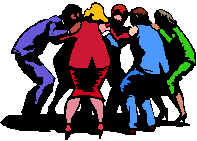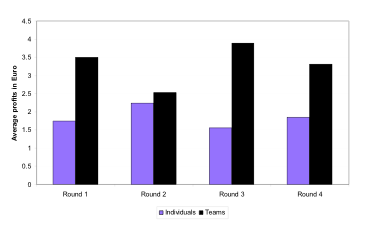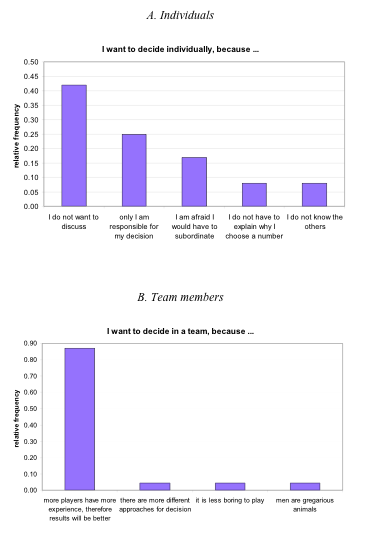« Fame at last | Main | Do crowds make better decisions than individuals? Yes, says author James Surowiecki in The Wisdom of Crowds »
September 07, 2004
Why do people choose to work alone or on teams? Which has better outcomes?
INDIVIDUAL OR TEAM DECISION-MAKING - CAUSES AND CONSEQUENCES OF SELF-SELECTION

People are social animals. There are at least two kinds of decision-making techniques. One technique is to make decisions individually. The other technique is to make decisions as a team. A recent study by Martin Kocher, Sabine Straub and Matthias Sutter, in Discussion Papers on Strategic Interaction from Max Planck Institute for Research into Economic Systems, Strategic Interaction Group, investigates the causes and consequences of individual or team decision-making and what effect the liberty to opt for either technique has on an individual's ability to make effective decisions. Kocher, Straub and Sutter found that the endogenously formed teams performed significantly better by earning nearly twice as much money in an experiment as did individuals.

We can see here that teams earned significantly more than individuals in rounds 1, 3, and 4 as well as for all rounds together. Team members win on average 13.2 euros but individuals only 7.4 euros.

Participants were encouraged to write down any additional reasons that were important for their decisions. We see here a summary of the additional arguments into nine different categories.
The most important reason for participants who opted for team decision-making was the expectation of better decisions and, thus, higher profits. Most of the subjects choosing individual decision making stressed the importance of being able to decide alone, without any need for discussion or compromise. No participant who prefered to act alone referred to profits or the quality of decision-making, instead all arguments were related to the process of decision-making. Both types of decision makers, interestingly, were highly satisfied with their chosen role.
Abstract:
Even though decision-making in small teams is pervasive in business and in private life, little is known about subjects' preferences with respect to individual and team decision-making and about the consequences of respecting these preferences. We report the results from an experimental beauty-contest game, where subjects could endogenously choose their preferred way of decision-making. About 60% of subjects prefer to act in a team, and teams win the game significantly more often than individuals. Nevertheless, both individuals and team members are highly satisfied with their chosen role, but for different reasons.
Excerpt:
"Teams are generally expected to make better decisions than individuals, and decisions made by teams are often accepted to a larger extent by those affected by these decisions. Furthermore, decision-making teams allow for the possibility to decentralize authority, encourage gains from knowledge transfers and may help to introduce optimal incentive schemes that can be supervised by peer pressure rather than by more costly shirking detection technologies. Thus, teams have become important vehicles for identifying high-quality solutions to emerging organizational problems (Jehn et al., 1999)."
Posted by DSN at September 7, 2004 06:57 PM